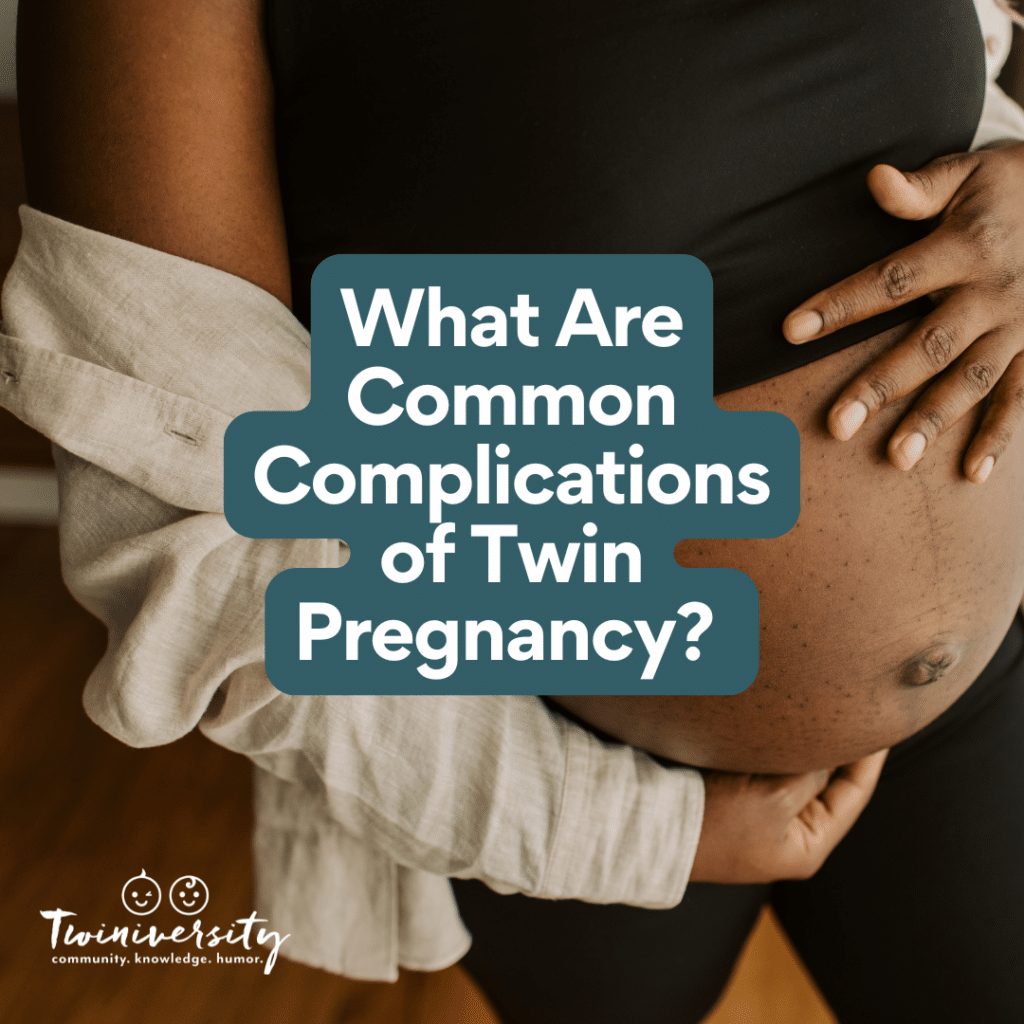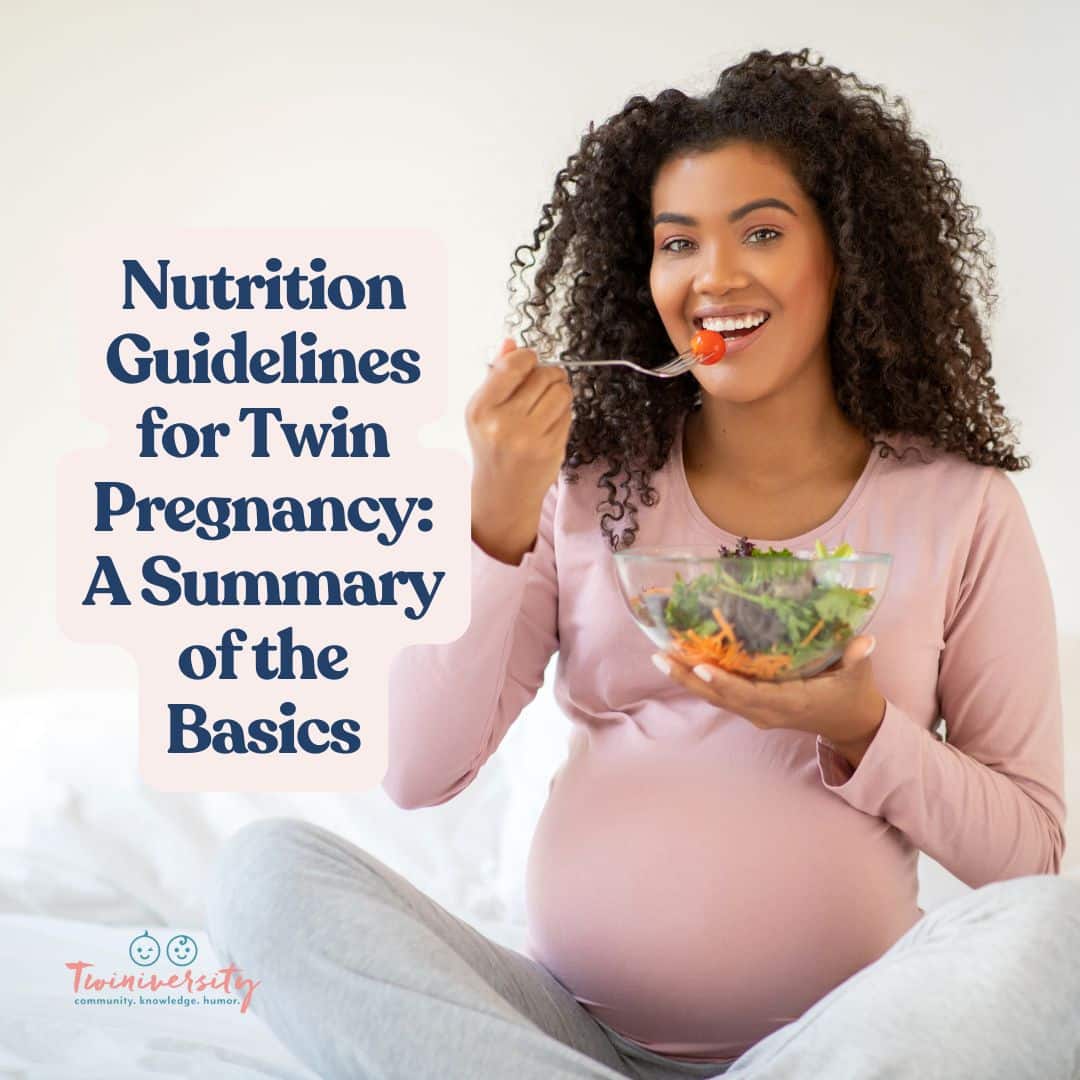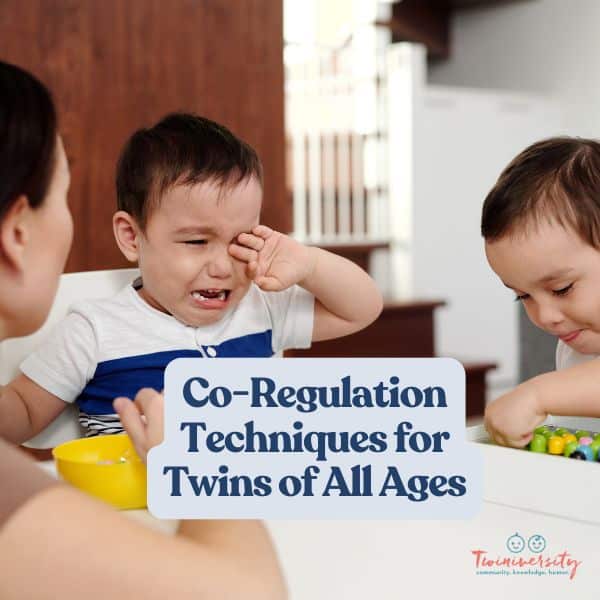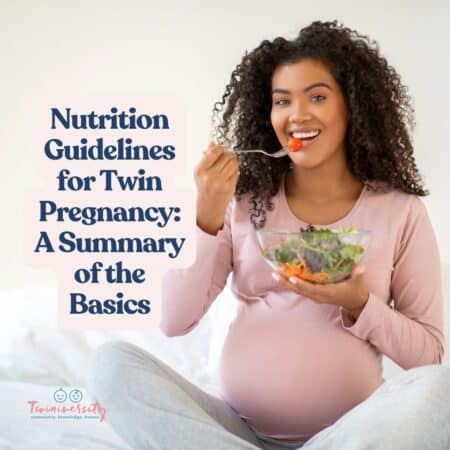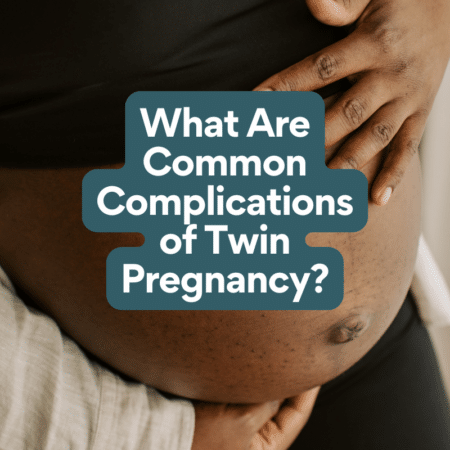
Pregnant with twins and finding yourself googling: what are the complications of twin pregnancy? You’re not alone. We’re here with answers for you about the most common complications for twin pregnancies.
Unless you’ve been pregnant before, you’ve likely been misled into a simplified understanding of how pregnancy works. You get pregnant, deal with some temporary challenges—crazy cravings, morning sickness, etc.—and then poof, you have the baby!
It sounds linear enough, right?
But of course, pregnancy can be much more complex than that (at least in my experience). And if you’re pregnant with twins, your mind may be swirling wondering about the extra complications of twin pregnancy.
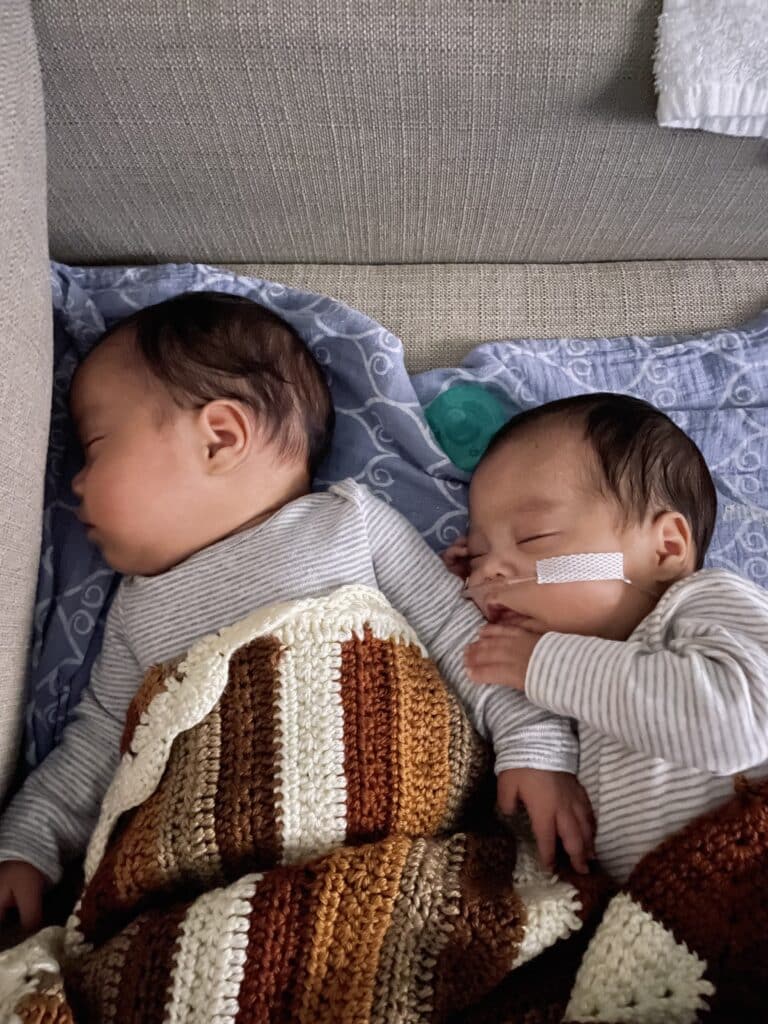
Thankfully, my twin pregnancy was fairly easy for the first trimester. I had the usual tired feelings but no morning sickness. (I did have a meat aversion which I was told was very normal). No biggie there.
But then came the second trimester of my twin pregnancy. That was tricky because my placenta was dangerously close to my pelvic floor which made me unable to workout.
The third trimester was even harder. I was told I had to be mostly on bed rest because my blood pressure kept spiking. Having been through a fraction of complications, it made me wonder about other complications expecting twin moms are up against.
So, if you’re expecting twins and want to be super informed, keep reading for a list of 7 common complications of twin pregnancy to be aware of.
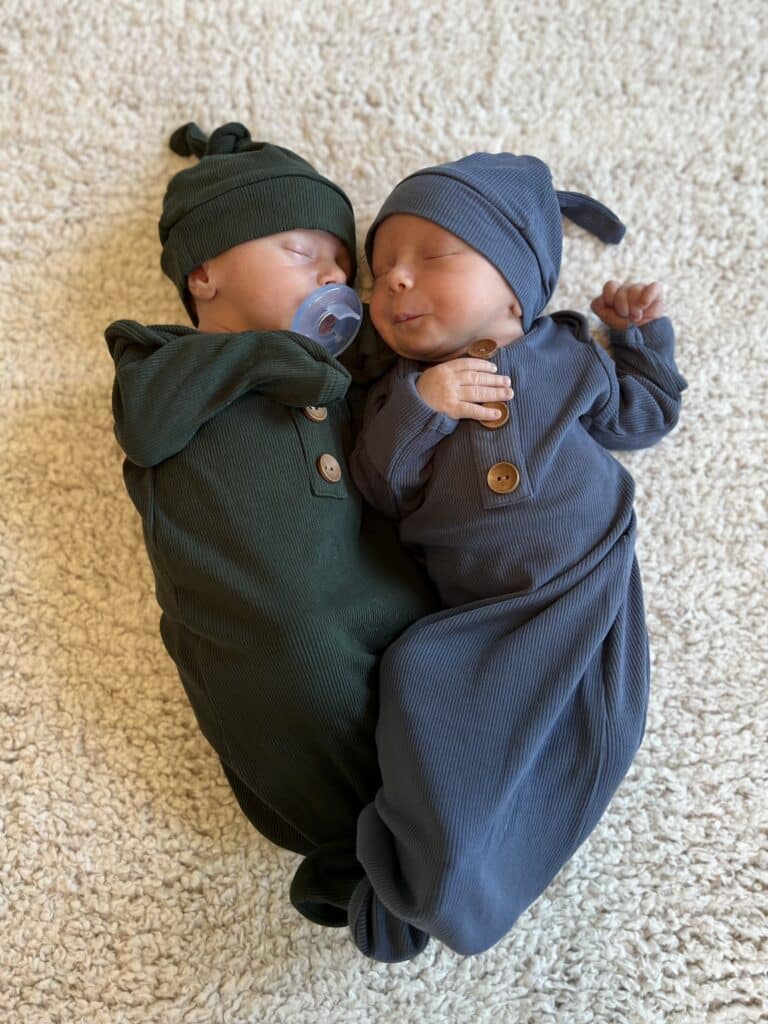
Please keep in mind that this list isn’t meant to cause you alarm. Instead, it’s meant to educate you and help you be more aware about twin pregnancy challenges to look out for. Of course, your concerns should always be addressed with your doctor!!
Disclaimer: All content on this website, including medical opinions and any other health-related information, is for informational purposes only and should not be considered to be a specific diagnosis or treatment plan for any individual situation. Use of this site and the information contained herein does not create a doctor-patient relationship. Always seek the direct advice of your own doctor in connection with any questions or issues you may have regarding your own health or the health of others.
Are You a New Twin Parent?
Check out Natalie Diaz’s book:
“What To Do When You’re Having Two
The Twin Survival Guide From Pregnancy Through the First Year”
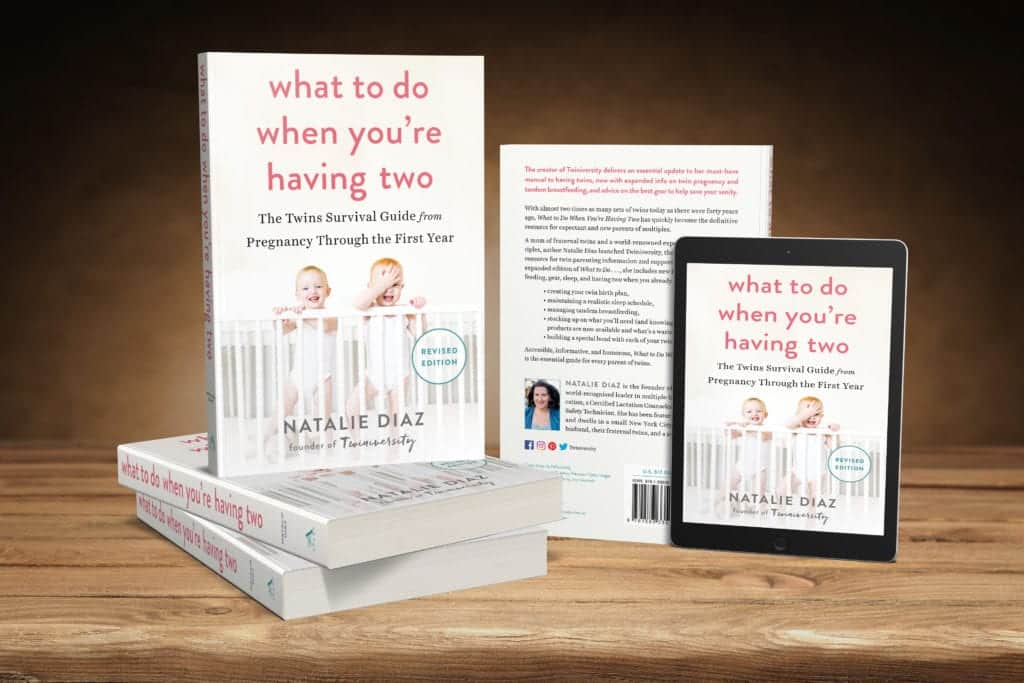
In What to Do When You’re Having Two: The Twins Survival Guide from Pregnancy Through the First Year, national twins guru and founder of Twiniversity (and twin mom herself!) Natalie Diaz provides a no-holds-barred resource about life with twins, from pregnancy and birth all the way through your duo’s first year of life.
Accessible and informative, What to Do When You’re Having Two
is the must-have manual for all parents of twins.
1. Preterm labor with twins
Let’s start with a well-known complication of twin pregnancy that everybody brings up: preterm labor.
Premature birth is a common complication with pregnancies involving multiples. In fact, more than 60% of twins and multiples are born prematurely. So what qualities as being “premature” anyway?
According to the World Health Organization, a preterm birth means any birth that occurs before 37 weeks gestation.
If you experience this, your doctor will be there to plan out your options and back-up plans. Babies who are born before 37 weeks often need medical intervention in a NICU because their bodies and organ systems haven’t fully matured.
There are great hospitals and organizations out there with amazing people who can help with prematurity in twins. I refer to them as angels in scrubs because that’s really who they are. This includes the nursing and doctor staff at the NICU. There are also other unsung friends like the Little Giraffe Foundation, Madhatter Knits, and March of Dimes.
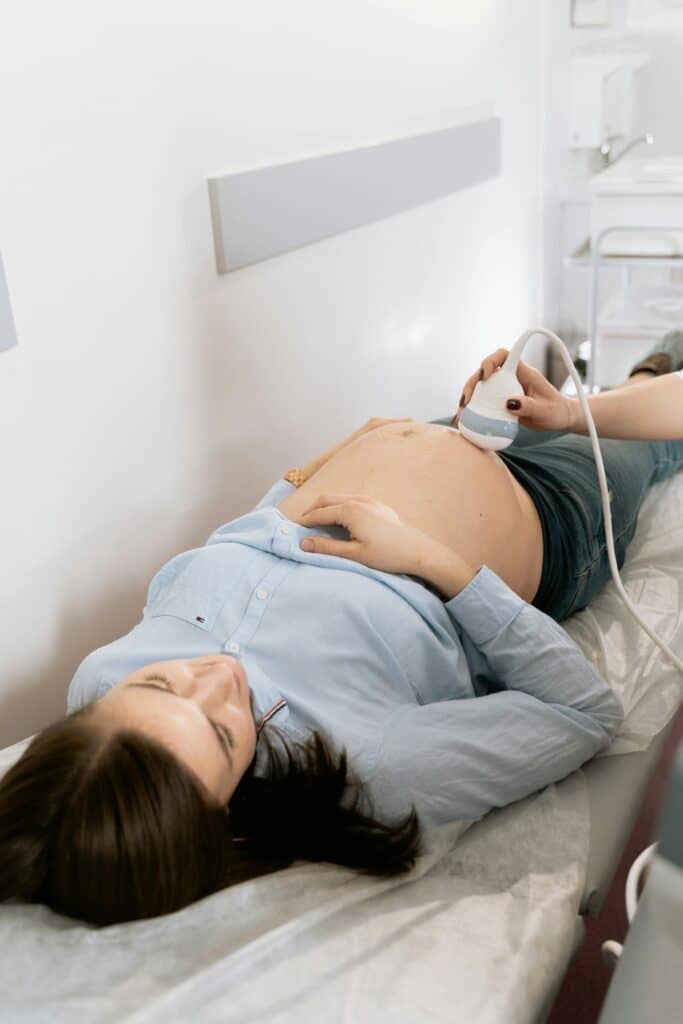
Symptoms to look out for with preterm labor:
- Contractions roughly every 10 minutes (contractions feel like your abdominal muscles tightening for a few seconds or minutes at a time)
- Vaginal discharge changes (like bleeding or leaking fluids)
- Intense pressure in your pelvic area (like the baby is pushing down on your pelvis or cervix)
- A dull, low aching in your back
- Period-like cramps
- Abdominal cramping
- Diarrhea
Learn more about preterm labor and prematurity with twins:
- How to Avoid Preterm Labor
- Know the Signs of Preterm Labor
- Premature Love: Helping Preemies Grow
- My High Risk Preemie Twins Birth Story
2. Vanishing twin syndrome (or miscarriage)
Vanishing twin (VTS) was a recent term I heard from a couple of different moms as of late. It’s a type of miscarriage that happens with twin pregnancies and multiple pregnancies.
VTS occurs when multiple embryos were detected during an ultrasound but can’t be found on future ultrasounds. Usually with this twin pregnancy complication, the tissue from the other twin gets absorbed by the other embryo and the mother.
VTS most often occurs in the first trimester. And while it may cause sadness and alarm, the surviving twin is usually able to carry on in a healthy pregnancy.
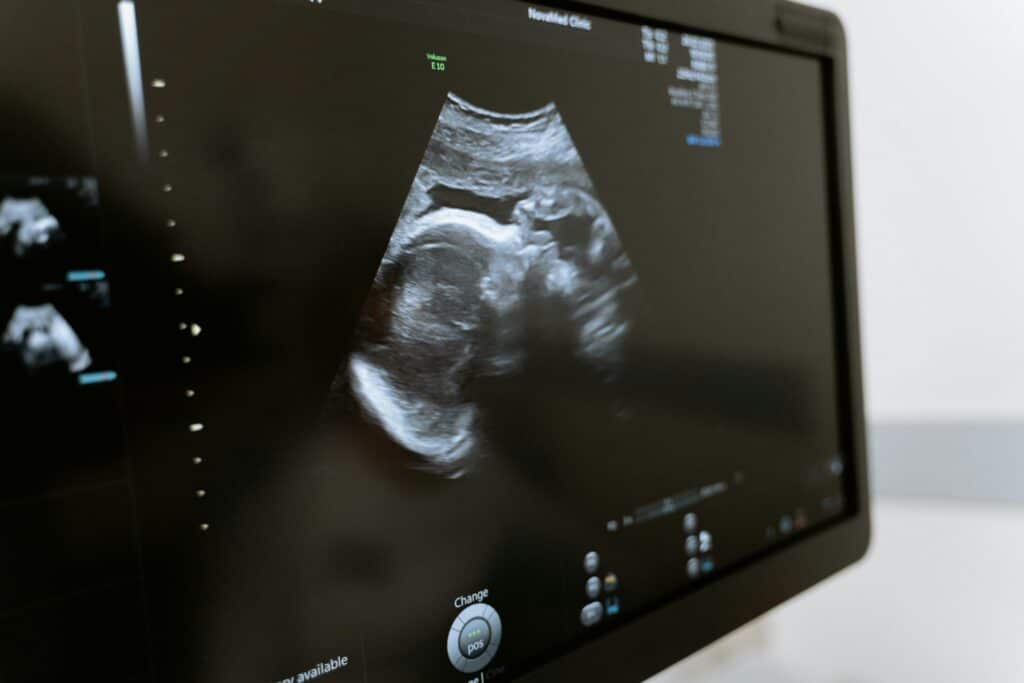
Symptoms to look out for with vanishing twin syndrome:
- Cramps in your uterus
- Light bleeding or spotting
- Pelvic pain and/or back pain
- Sudden drop in hCG levels
Learn more about vanishing twin syndrome and how to get support:
3. Gestational diabetes (GD)
Gestational diabetes is when you develop diabetes for the first time during pregnancy. This is usually diagnosed when you do the 1-hour and 3-hour glucose test between weeks 24 – 28.
This pregnancy complication can happen for singleton pregnancies, but it’s even more common in twin and multiple pregnancies. One study found that gestational diabetes was three times more likely to develop in a twin pregnancy compared to a singleton pregnancy.
Like other types of diabetes, pregnant twin moms with GD will have to manage their sugar intake during this time. This may involve doing regular blood sugar readings, checking in frequently with your OB, and making dietary changes.

Controlling your blood sugar during pregnancy will help keep you and your babies healthy. And the good news is that gestational diabetes is likely to go away once you deliver.
Symptoms to look out for with gestational diabetes:
- Fatigue
- Nausea
- Blurred vision
Learn more about gestational diabetes:
4. Anemia of pregnancy
Another complication of twin pregnancy is anemia. Anemia is a medical condition marked by a low red blood cell count. Red blood cells are responsible for delivering fresh oxygen throughout the tissues in your body.
When you’re pregnant, your blood volume increases. This means your body is hard at work making more red blood cells. But in order to make more red blood cells, you need more vitamins and minerals (like iron).
Anemia of pregnancy can often be managed with iron supplements and an altered diet. This could include eating foods with higher iron (i.e. spinach, lean beef, etc.) and consuming more Vitamin C (which helps absorb iron).
Another complication for twin pregnancies involving anemia is called Twin Anemia Polycythemia Syndrome (aka TAPS). This happens in twins who share a placenta when one of the twins becomes anemic due to an imbalance of red blood cells.

Symptoms to look out for with anemia:
- Fatigue
- Dizziness
- Feeling out of breath
- Feeling colder than usually
Learn more about anemia of pregnancy:
5. Twin to twin transfusion syndrome (TTTS)
This is a rare condition but happens with identical twin pregnancies where they share the placenta but have separate amniotic sacs (aka mono-di twins). TTTS happens in about 10-15% of mo-di twin pregnancies.
Here’s the gist of what happens…
- The blood flow isn’t evenly distributed between the two twins and one ends up receiving more blood than the other.
- The twin receiving less blood grows poorly and has a low level of amniotic fluid.
- Meanwhile, the one who is receiving high levels of blood grows well but has high blood pressure that causes strain and high levels of amniotic fluid.
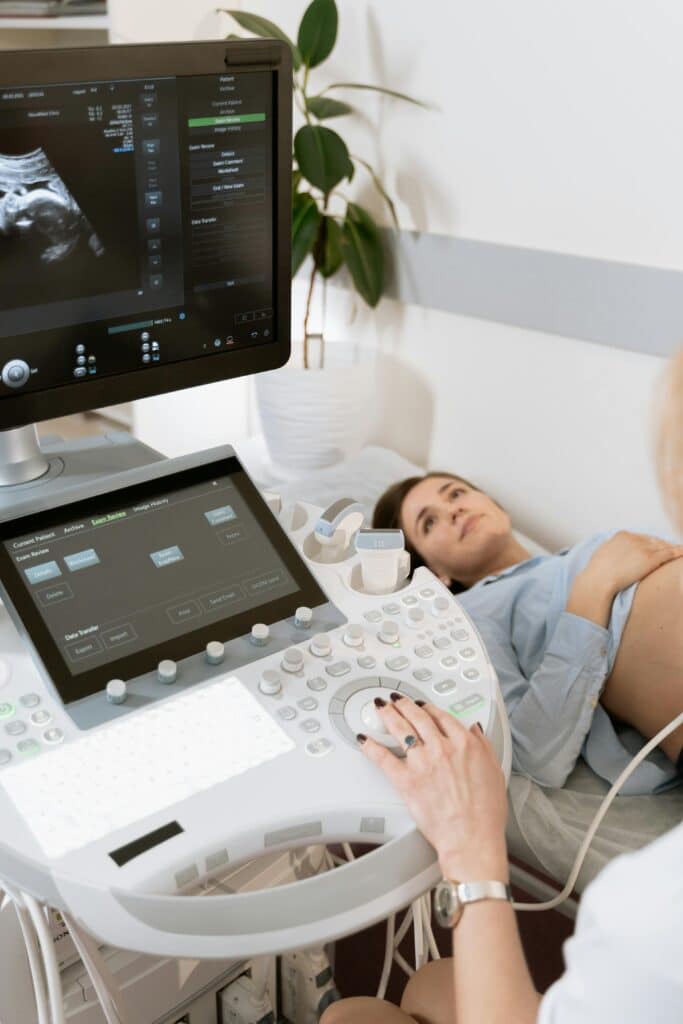
If left untreated, TTTS could become fatal for one or both twins. But thankfully, with modern medical screenings, TTTS is usually detected.
Symptoms to look out for with twin-twin transfusion syndrome:
- Abdominal discomfort
- Ruptured membranes
- Preterm labor
Learn more about TTTS:
- Coping With TTTS: Twin to Twin Transfusion Syndrome
- TTTS: The Weinstein Story
- It’s World TTTS Day: Do You Know the Facts?
6. Gestational hypertension and preeclampsia
This is the pregnancy complication that I suffered from. (Super fun, not!) Once I was diagnosed with gestational hypertension, my visit to the doctor went from once every two weeks to twice every week.
There are actually four types of gestational high blood pressure:
- Chronic hypertension – develops either before or during the first 20-weeks of pregnancy.
- Chronic hypertension with superimposed preeclampsia – condition when chronic hypertension leads to worsening high blood pressure during pregnancy. People with this condition develop protein in the urine or other complications.
- Gestational hypertension – this one develops after 20 weeks of pregnancy (me!). This could lead to preeclampsia. (Which is why my doctor had me basically on bed rest. I also had to test my blood pressure at home, increase my protein intake, and decrease my sodium intake).
- Preeclampsia – when hypertension develops after 20 weeks of pregnancy. This is a mean one. It’s associated with signs of damage to other organ systems including the kidneys, liver, blood, or brain. If left untreated, it could lead to serious/fatal complications. This is why your doctor will tell you to always reach out if you experience any signs of preeclampsia.
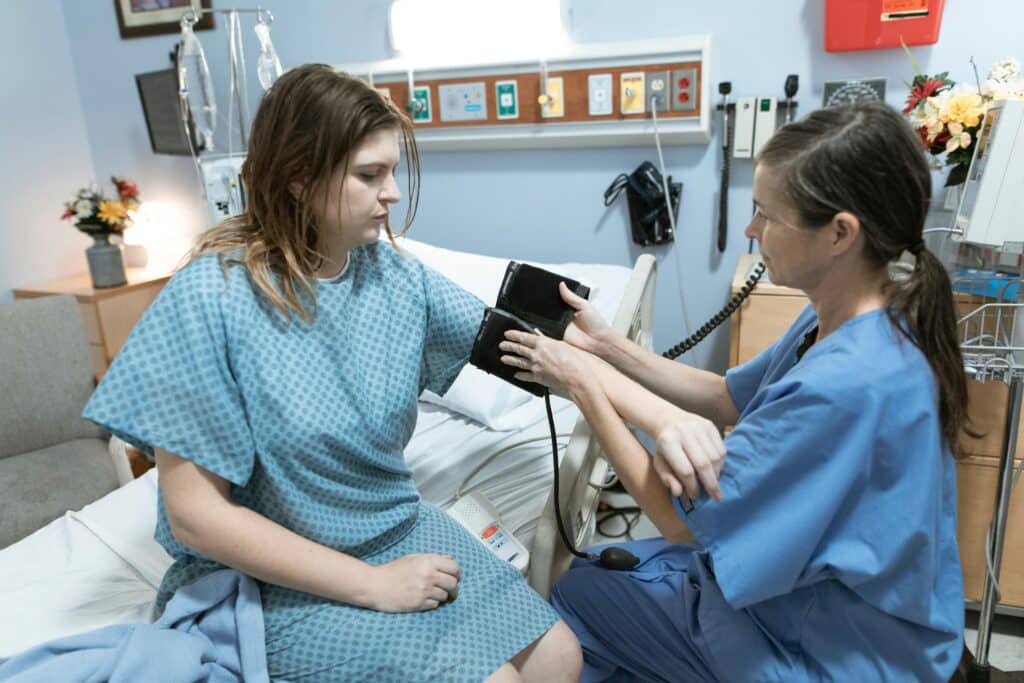
Preeclampsia can cause extra complications like:
- Less blood flow to the placenta
- Placental abruption
- Intrauterine growth restriction (IUGR)
- Injury to other organs (for mom)
- Premature delivery
- Future cardiovascular disease (for mom)
Symptoms to look out for with gestational hypertension and preeclampsia:
- High blood pressure
- Presence or absence of protein in the urine
- Swelling (edema)
- Persistent headache
- Weight gain that happens suddenly (like 2-5 pounds in one week)
- Blurry or double vision or seeing flashing lights
- Vomiting
- Nausea
- Abdominal pain on the upper right side or pain around the stomach
- Only being able to pee in small amounts
- Changes in liver or kidney function tests
- Trouble breathing
Learn more about preeclampsia:
7. Cord entanglement with twins
This is a risk for twins sharing an amniotic sac, and it’s exactly as it sounds. Their umbilical cords could get tangled. Cord entanglement can cause dangerous interruptions in blood supply to one or both of the twins. If cord entanglement is suspected, the babies will need to be monitored closely.
Symptoms to look out for with cord entanglement:
- Irregular fetal heartbeat
- Decreased fetal movement
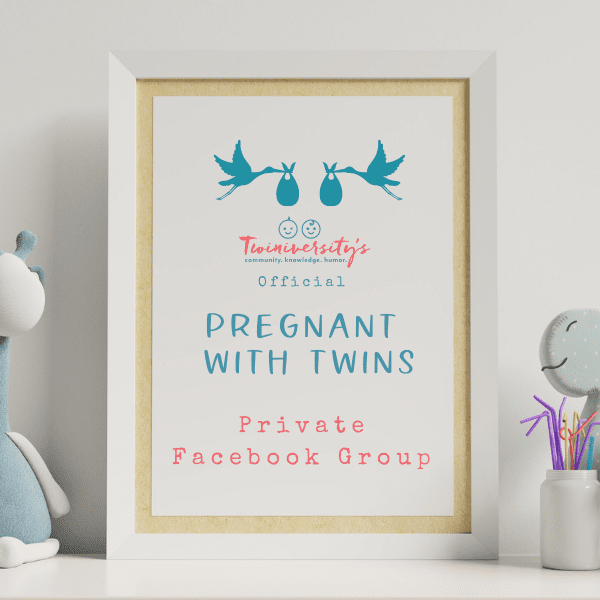
Did you know we have a FREE Facebook group just for expecting twin parents? Hurry and join today to find support from expecting twin mamas who get it!
8. Postpartum hemorrhage
This is when you have severe bleeding after birth that causes a sharp drop in blood pressure. This sudden drop can affect blood flow to your heart and other organs.
When your organs don’t receive the blood flow needed, the body goes into shock (hypovolemic shock). Postpartum hemorrhage can happen regardless of whether you have a natural delivery or a c-section.
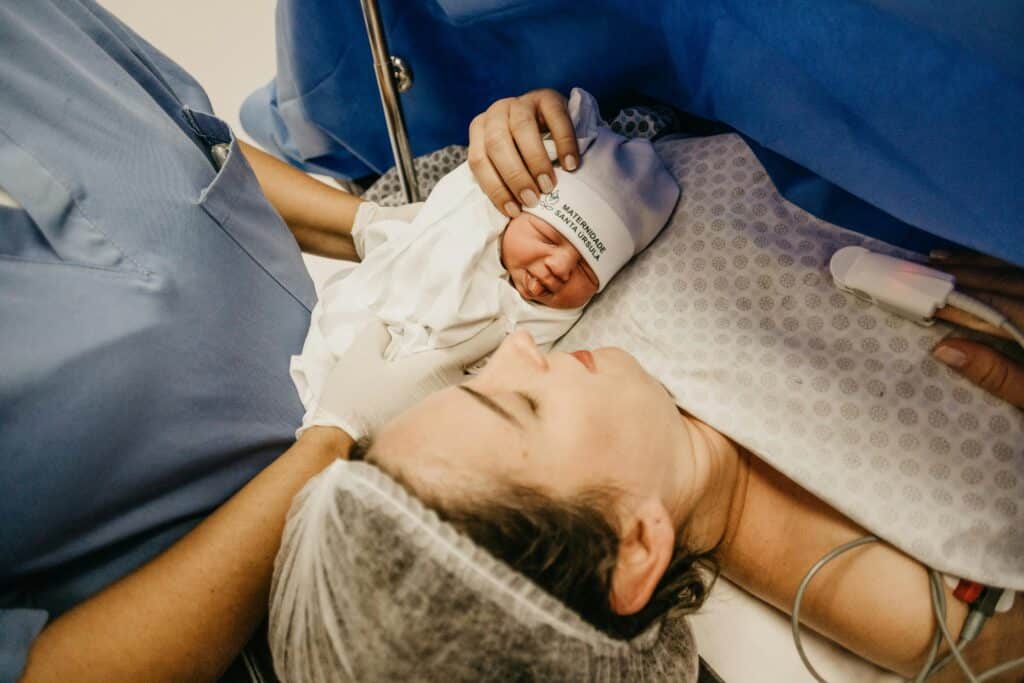
Symptoms to look out for with postpartum hemorrhage:
- Low blood pressure
- Increased heart rate
- Heavy bleeding
- Low red blood cell count
- Pain or swelling around the vagina
Learn more about postpartum hemorrhage:
Other complications of twin pregnancy
Here are a few other potential complications that are at an increased risk with twin pregnancies:
- Congenital birth defects (like heart, lung, and gastrointestinal abnormalities)
- Placental abruption (when the placenta detaches too early)
- Selective intrauterine growth restriction (sIUGR)
- Twin reversed arterial perfusion (TRAP)
Final thoughts on complications of twin pregnancy
I realize this list may seem daunting, but please remember that this article meant purely to help inform you about complications that are more likely in twin pregnancies. Not to freak you out or make you feel like you are going to certainty have a complicated pregnancy.
Being a self-diagnosed hypochondriac, it wouldn’t have done me well (mentally) to have known all this existed during my pregnancy.
But the bright side to all of this is that twin pregnancy complications are well-known. That means your team of doctors should be able to help you navigate the unique obstacles that may come your way.
If you are experiencing any complications during your twin pregnancy, my heart goes out to you. I am sending you all the positive energy I possibly can through this screen.
Struggling with a complicated twin pregnancy? Read more about how to cope here:

Stephanie Miller is the proud mom of twin cyclones Zach and Carter. Every day in the Miller house, you’ll find rooms turned over, floors covered in bits of Lego and puzzle pieces (mind your step), and the sound of “Brown Bear Brown Bear” read over and over, and over again. You’ll typically find her being used as the seat to reading time for the two bookworms, covered in bubble solution as they try to excel in their Bubble Wand skills, or being the voice to command Alexa for their favorite tunes. She and her husband are working on their traveling skills cause she can’t wait to show them the amazing world that is out there for them.

